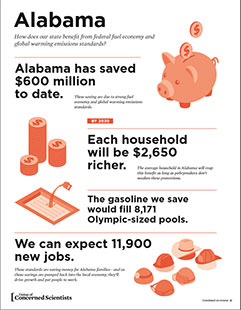In 2012, the U.S. secured strong federal fuel economy and global warming emission standards. The standards are reducing the country’s oil consumption, saving consumers money at the gas pump, and protecting public health and the environment. But proposals to weaken the standards are gaining traction in the Trump administration. If policymakers decide to go down this route, the benefits the standards bring to consumers and local economies will also wane.
UCS analyzed these benefits for each of the 50 states and Washington, D.C and found that:
- As long as policymakers don’t weaken these protections, the average household will net nearly $2800 in savings by 2030, even after considering technology costs.
- Despite regional differences due to population density, vehicle mix, and gas prices, all states come out ahead thanks to strong standards.
- The standards are saving money for families across the nation—and when those savings are pumped back into the local economy, they drive growth and put people to work. Click on the links to view the benefits for each state.
Click on the links to view the benefits for each state.
Alabama | Alaska | Arizona | Arkansas | California | Colorado | Connecticut | Washington, DC | Delaware |
Florida | Georgia | Hawaii | Idaho | Illinois | Indiana | Iowa | Kansas | Kentucky |
Louisiana | Maine | Maryland | Massachusetts | Michigan | Minnesota | Mississippi | Missouri | Montana |
Nebraska | Nevada | New Hampshire | New Jersey | New Mexico | New York | North Carolina | North Dakota |
Ohio | Oklahoma | Oregon | Pennsylvania | Rhode Island | South Carolina | South Dakota | Tennessee | Texas |
Utah | Vermont | Virginia | Washington | West Virginia | Wisconsin | Wyoming




